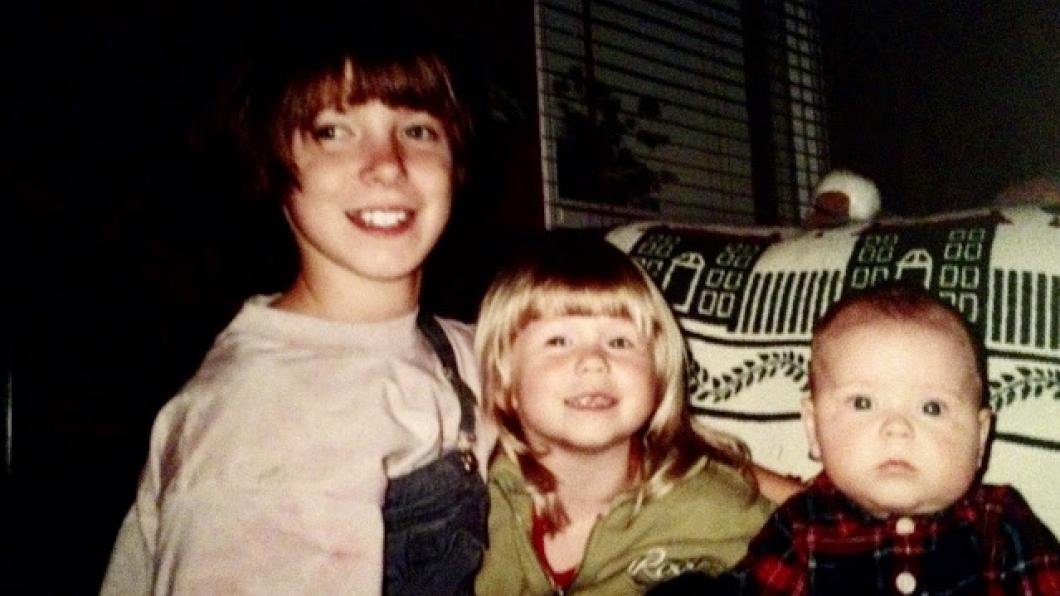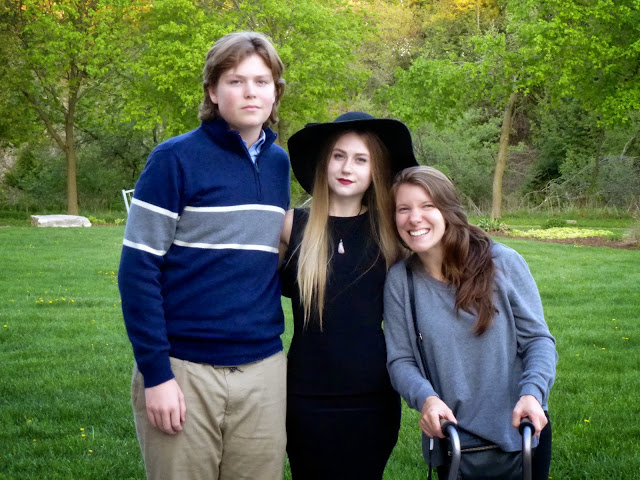
Sisters: 'Look at me, I'm disabled too!'
By Jessica Geboers
When I was a child doing physical therapy at Grandview, my younger sister Avery climbed into a nearby hand-bike and began riding around the room calling out, “Look at me, I’m disabled too!” She wasn’t trying to be offensive or insinuating that I, somehow, had it better; she only wanted to fit in and have fun like me.
I often ask my mother what she thinks BLOOM readers may be interested in reading about. In addition to her own personal experience of raising me, she now belongs to a Facebook group where moms of children with cerebral palsy share stories and advice. Mom suggested that I write about siblings, given that parents in the group often express concern about not spending enough time and attention on their able-bodied children because their child with a disability requires more care. They also worry, she said, that they might be putting too much pressure or responsibility on their children without disabilities to pick up the slack.
These concerns seemed reasonable, even for larger families with many children without disabilities. Like any good journalist, I decided to begin with some preliminary Internet research to see what had been written on the subject. What I found focused mainly on siblings of children who had severe disabilities and required constant care.
While this is obviously a reality for many families, it didn’t apply to my family. I am moderately disabled and able to take care of myself for the most part. Growing up, my parents always told my siblings—sister Avery, now 17 and brother Jared, 15—and I and anyone else that was around that I was part of the family but that our family didn’t revolve around my disability and me. This meant that while I may have needed extra care, my parents were also mindful to make time for Avery and Jared as well. So, for all the time they spent playing with the toys and adaptive equipment while I went through physiotherapy, it could be said that they were just killing time until Mom dropped them off at gymnastics or hockey.
In a lot of ways, this was Avery and Jared’s normal. Mom recently reminded me that it wasn’t until my sister began school that she realized that not everyone needed ankle-foot orthoses or had sisters who were disabled. Every morning Avery sat on the bottom stair trying to put my AFOs on the way I did, while telling Mom that she couldn’t go to school without leg braces. Before then she hadn’t known any different. Avery even learned to walk pushing my walker around the front lawn.
Obviously, Jared, who came along two and a half years after Avery, had a wider frame of reference, but he was still rather desensitized to my differences. Once he learned to walk, his favourite game was running away with my canes. He learned very quickly that I couldn’t get around, let alone get them back from him, without at least one of them. (This is when I learned to get around the house with the aid of the furniture and walls; from which point onward Mom cursed me as she scrubbed my fingerprints from the walls.) Once Jared began to talk, he would yell, “You’re nothing but disabled!” whenever he got mad at me. “Thanks Tips” was often my response.
When I was around eight, and we still lived within walking distance of our grandparents’ house, Dad would often walk us over to visit them. I would drive the grey Power Wheels Jeep my parents gave me as a reward for using my quad canes for two months straight. My sister was strapped into the passenger seat with a pillow for support and always fell fast asleep (how she slept through my jerky stop-go-stop-go driving no one could quite understand). Our green wagon, the one with two seats and a door, was attached to the back carrying my canes and whatever else we needed to bring. Dad, with seemingly endless patience, strolled slowly behind us.
Avery grew into what my mom calls a “Mensa baby” because she not only reached all of the expected milestones in a way that I had not, but she did so quite early. My parents couldn’t help but be shocked and impressed. Not long after she crawled, she walked, climbed and ran. One of her favourite activities for a time was dismantling her crib, escaping from her room and climbing into bed with me (although I now find this funny and cute, at the time I had mixed feelings). To try to remedy managing a wheelchair and a double stroller, Mom briefly entertained the idea of putting Avery on a harnessed leash of sorts. This was short lived however, as Avery quickly began behaving like a dog in public, and I encouraged her by laughing shamelessly and patting her on the head. From then on, the kids would take turns riding on my lap.
The juggle and struggle of three kids, one with special needs, never stopped Mom from taking us on trips and activities. Together we have flown countless times between Toronto and Edmonton and Palm Springs to visit family, and been horseback riding in Banff and white water rafting in Jasper. Mom told me that rarely if ever did she worry about how to manage us until we were on our way and she had no choice but to figure it out.
A great example was rafting: When our 20-something instructor, highly attractive, shirtless and with a nipple piercing, saw me struggling to walk over the rocks to the boat, he picked me up out of nowhere and carried me to the boat to sit with him. I was 15 and mortified that my mother might tease me, as she looked like she could barely contain her laughter. Although it wasn’t always easy, I really appreciate my mother’s determination to do these sorts of things with us. Not only has it given us all wonderful family memories, but it has also taught me not to be held back by a potential struggle because it could be worth it for the life experience.
As the oldest I’ve spent a lot of time babysitting and caring for my siblings while my parents worked. This included playing house with my sister while she used my canes to pretend she was disabled too; watching movies while pretending our living room was a movie theatre; trips to the park, me with my walker and them on Jared’s Power Wheels dirt bike; and making grilled cheese, Kraft Dinner, chicken nuggets or tea and toast—the only foods they’d eat for years.
When my brother and sister began school, I assisted with kindergarten and primary school homework. When they bathed I would answer the call to rinse soap from their eyes and check their hair was free of shampoo. To accomplish a lot of these things I taught them how to “help me help them” by carrying things, opening doors or climbing up on the counter to reach dishes I was too short to reach (thanks to my short stature of 4 foot 9). I may not have always appreciated this time with my siblings, but in hindsight, I love this time with them! They were so funny and cute, and it made me feel good to play a helpful role in my family. I’ve also realized, as I’ve gotten older, that it’s helped me to prepare for the possibility of having my own children.
However, this isn’t to suggest that there was never any jealousy. We battled from time to time for the upper hand, as many siblings do. But, likely due to the age gap between the kids and I, most of the jealousy came from me rather than them. I’ve always admired the apparent ease with which they did things, and I never wanted to see them waste their potential—especially when it came to their education. The struggle to accept my physical disability is definitely real—and at times, ongoing—but I’ve always been particularly annoyed with the limitations of my learning disability. Although I’ve often enjoyed school and achieved good grades, I’ve always had to work hard to achieve them. (I think one of the reasons school has always been so important to me is that, unlike my CP, I have a bit more control over it and can more easily combat it with time and effort).
Avery, on the other hand, is quite naturally academically inclined. I’ve always felt that if one can do well easily, one should. So I’ve always encouraged the kids about the importance of school. In reaction to Avery’s apparent ease, both my parents and I have always praised her while unintentionally developing an expectation of her success. And although it is difficult for me to know the full extent, we have learned in recent years that this expectation resulted in Avery putting a lot of pressure on herself. She feared disappointing us if she did not keep it up. We now make an effort to praise her accomplishments without any implied pressure. Jared has always been far less bothered by such things, and is quite easy going in general.
When Avery, Jared and I would argue while growing up, Mom would often remind us to be kind as we may need each other one day. This always bothered me because I took it personally to mean that I may not be able to remain independent as I aged. More recently, I realized that Mom only wants us to be able to depend on each other as family. It has also been an interesting realization for me, now that the kids are older, that I can depend on them to help me.
For instance, when we were at the West Edmonton Mall’s indoor waterpark a couple of years, Avery and Jared worked together to assist me: in inner tubes, we all linked together, with me in the middle, to keep me from floating too far from them in the waves. Later, Avery held me up as we walked out of the pool towards my canes. Mom was so happy with this that, we later discovered, she took a photo and sent it to Dad. More recently, when I injured my back in a fall, Avery came to Toronto to look out for me. Jared, while he is less likely to volunteer, will help me if I ask him to carry or reach something. I see the effect of growing up with me more so in the way Jared responds to and is tolerant of others who are different. While the other boys made fun of another boy in his class with CP, Jared did not, and was mindful to help him when needed (even though, Jared told me, he did find the boy a bit annoying, but not because of his disability).
During my research in preparation for this piece, I asked Avery if she had ever been jealous of me or worried about caring for me when we were older. She told me she’d never been jealous, except when I went to Easter Seals’ Merrywood Camp: “That made me a bit jealous,” she said, “because it looked like fun.” As for caring for me, she’d never given it much thought because I was older and she’d always seen me take care of myself. “I’ve just thought that maybe we should live in the same city,” she said, which we soon will.
Avery recently rented an apartment in Toronto with a friend in my building and will be studying at the Ontario College of Art and Design in the fall. Not that I think Avery moved here for me. It just so happens that we both love Toronto. But it will be nice to have her close by. As much as I hate to admit such things, maybe Mom was right: we may need each other one day.
